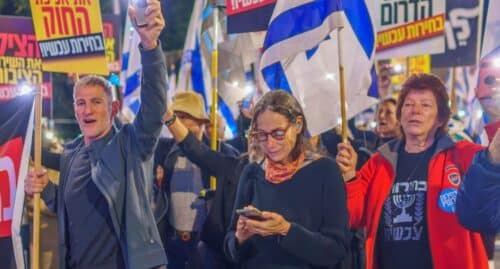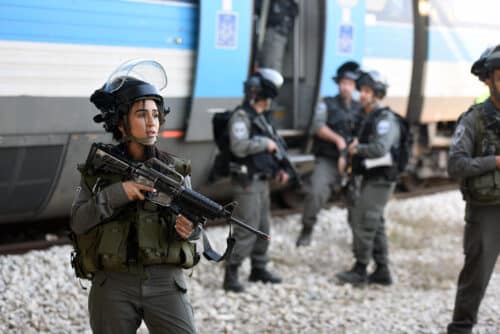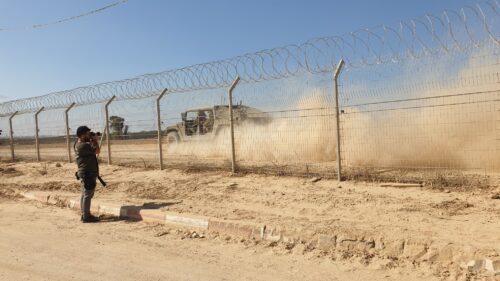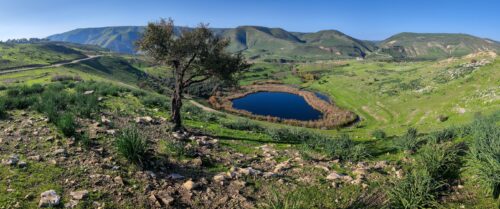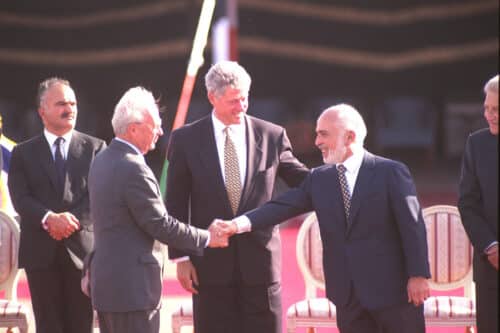The moment that Oren, a Brigadier General in the reserves, heard the massive volley of rockets on the morning of October 7, he understood that this time was different. From the volley’s intensity — easily apparent at the kibbutz where he lived, less than 4 kilometers from the border with Gaza — he understood that a surprise invasion, something Israel’s Gaza Division had been preparing for, was underway.
As a veteran of the National Security Council at the Prime Minister’s office and as battle coordinator for his division in the reserves, he was quite up to date on conditions as seen by Israeli intelligence on the eve of the incursion. In fact, he spent Friday morning, the day before Simchat Torah, at the Gaza Division’s headquarters — but he spent it preparing for exercises and training. However, even if he’d understood right away that the “surprise invasion” scenario was about to play out, he could not have imagined the scope of it. The scenario that the division was preparing for involved 2 to 4 simultaneous incursions, not dozens at once. For a challenge like the one that actually occurred, the division was unprepared.
He woke his wife and children up and told them (instead of good morning), “It’s an invasion. Go down and shut the house up completely.” He put his uniform on and joined his son, who serves as a northern sector intelligence officer in the Gaza Division. Oren happened to be hosting his son, daughter-in-law, and baby granddaughter for the holiday weekend. The two men made ready to go join their division. Oren’s son, having no uniform with him, set out in his holiday clothes. They were armed with a single handgun.
First at the Re’im festival’s parking lot
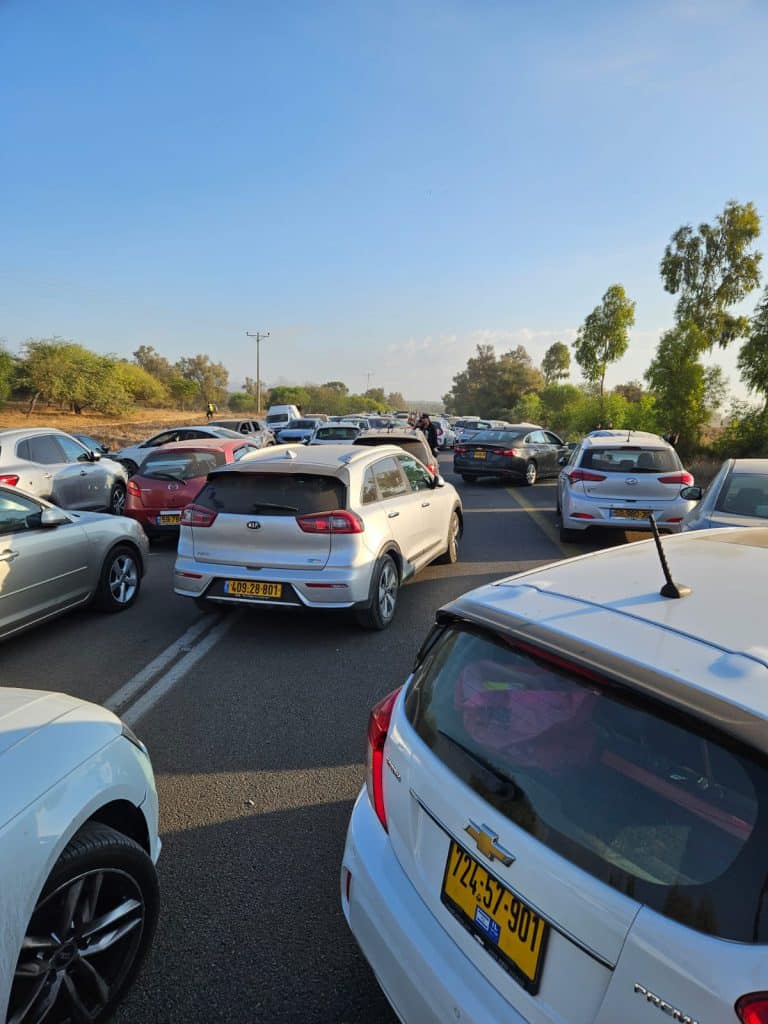
“On the way to my car, I could already hear the machine guns and I said to my son, ‘You see? The invasion is in your sector.’ In my mind, it was a localized invasion. When we were leaving through the gate of the kibbutz, I phoned the kibbutz security coordinator and told him to close the gates because we have a situation. We passed by Kibbutz Alumim, and at Alumim we already came under machine gun fire in intense bursts. My son noticed terrorists in a pickup truck, and I was surprised: So, they’ve reached this far? I accelerated and we managed to drive on unhit. Along the way, I blinked my lights and gestured at the oncoming cars, hoping they’d understand there was trouble ahead.”
After Be’eri, they came to the Re’im parking lot; and there they were met by a scene that prevented them from driving onward to the division. “We saw dozens of cars that couldn’t move — trying to escape from the festival site, but stuck. At this point, not a single bullet had been fired. There were no terrorists to be seen, just a crowd of civilians lying at the sides of the road with their hands on their heads for protection against the rockets. In fact, we were the first to arrive at the place. I knew there were terrorists, but those people didn’t know yet. I parked at the side, left the car, and told my son, “We’re not going to the division. Our job here is to save the civilians.”
Tell me what was happening at the festival site during that time.
“I shouted to them, ‘Run! Run toward the fields, toward Netivot.’ But the people were still confused and didn’t understand what was happening. They were telling me, ‘But I have stuff in my car.’ We convinced dozens and hundreds of people to run and to be evacuated, but they still didn’t grasp the situation. After a little while we began to hear shooting from inside the festival site, and some wounded people began arriving from there. At the same time, terrorists began to shoot at us on the road. Two brave policemen arrived, Michael and Oron. Later I came to know that they belonged to the security team at the festival. I told them, ‘Let’s make this the tactical retreat position. You take the left side, my son and I will take the right.’ In other words, I was still thinking in terms of tactical retreat — because I expected IDF forces to show up right away.”
Did you report to the division on what was happening?
“I’d already phoned the operations officer of the division and told him there was shooting in Alumim and Be’eri. Now I phoned again and described the situation. He said, ‘There are incursions everywhere. I have no troops.’ The terrorists on the road were aiming fire at us and at the traffic, including one RPG that exploded beside us and another that passed over our heads. It was a tough battle. We were shooting at them all the time, but our handguns might as well have been cap pistols.”
He removed his insignia: “If they kill us, they shouldn’t know they killed a senior officer.”
After an hour of battle, one of the terrorist squads began approaching them. “They’d reached a distance of maybe 6 cars away from us. We were waging a battle while skipping backward between the cars. I understood that we had no chance of pulling through by shooting handguns against the kind of weapons they had, so I took off my insignia and put them in my pocket. I told myself, ‘If they kill us, they shouldn’t know they killed a senior officer.’ I quietly said, Shma Yisrael… My son, fighting beside me, was the father of a 3-month-old girl, and I was thinking of her while fighting. Part of our ‘luck’ was that they were busy making sure of their killings, checking from car to car, and they didn’t charge at us. We saw one of them holding up a knife that sparkled in the sunlight.”
At that tense moment, suddenly a tank arrived. “It came out of nowhere and it simply drove over the cars and crushed them — and crushed some terrorists too. The terrorists shot an RPG at it, but it kept going. That tank kept them from charging at us. I phoned the division’s operations officer and asked him to give the tank directions toward the wooded area, but the operations officer couldn’t locate the tank. The tank drove in the right direction anyway, southward. It went on past us as if it were following instructions.”
After the tank, a car arrived. “The driver was one of the festival’s security team, Ilya, and he shouted to us to get in. Two police officers boarded it, and my son followed them in. He called to me, ‘Dad, get in here now,’ and he kind of woke me up; I’d been concentrating on confronting the terrorists. The car was small and it didn’t have room for us all. The door stayed open and my body was on the outside. It drove slowly but it hopped us back two hundred meters, and there I saw the tank nearby. I wanted to rush over and give it directions, but when I mounted it, I saw no one but a single dead body. Where was the crew? Kidnapped? Fled? I don’t know, but I couldn’t drive a tank alone. So I detached the commander’s MAG machine gun from the tank, took down a box of ammunition, and dismounted to set up a defensive position behind a mound of earth near the tank.”
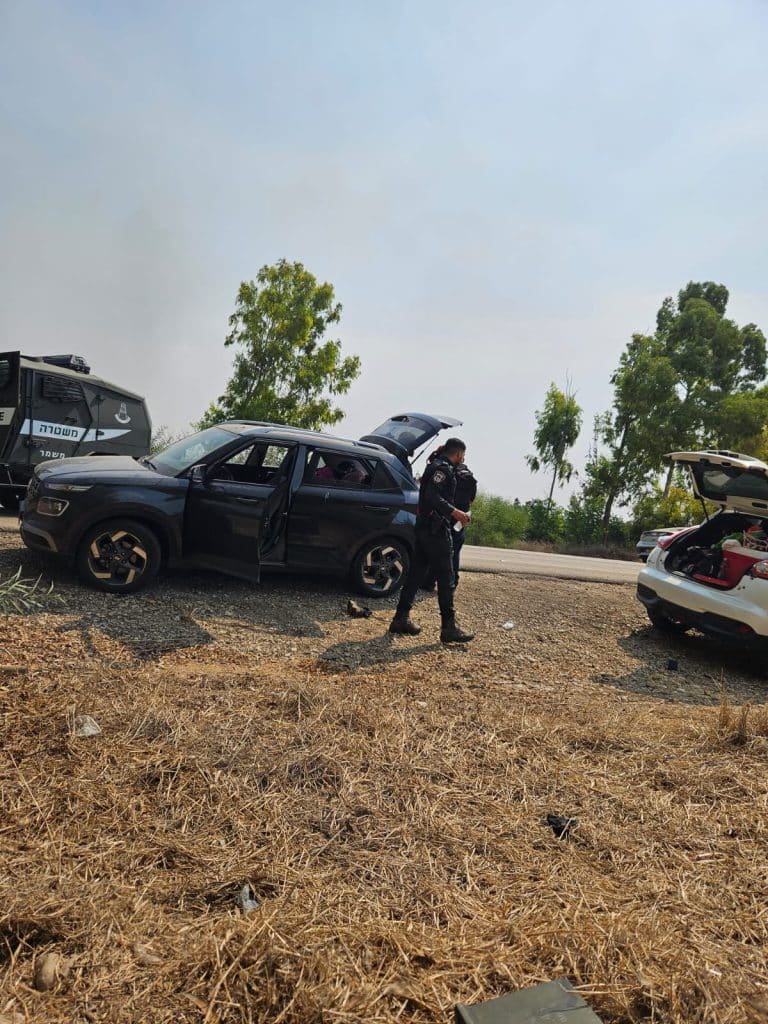
So at that point you were four armed men behind the tank.
“Right. My son and I were on the mound, and I divided the sectors between us and the two policemen. I called to them to bring grenades from the tank, and binoculars so that I could locate the terrorists and a distance and shoot them. Little by little, wounded people from the vicinity assembled around us — dozens of them. More than seventy. I tried to fire the MAG, but it was jammed. I wouldn’t cock. My hands got burnt by the hot cartridges. In the end, I did manage to fire and I shot in the terrorists’ general direction. A battle started, and it went on for hours. Waves of terrorists that we’d shoot at to pin them down.”
Were you still in touch with the division?
“I was always reporting the situation to the division and asking for troops or a battle helicopter, and in fact toward 11 o’clock — if I remember correctly — an intelligence officer from the northern sector spoke to me and asked me to provide directions for the battle helicopter. I explained where we were and where the terrorists were, but in the end, it didn’t shoot because the terrorists were hard to spot in the woods and civilians were there too. But just by circling above them, it gave us something like half an hour of grace. Then the crew told us that they had to move off to another mission.”
And you were alone again.
“Right. We were holding our position against terrorists who came at us in waves. In one wave, a squad of five terrorists charged us from two directions. I recognized three from the wooded area, and there were two in brown vests. I could see them with my naked eye, shifting among the bushes to my right. They came to within thirty meters of us, and then I opened fire with the MAG, and the policemen opened fire. We killed two at a distance of mere meters, and we stopped the rest. I sent the policemen to take the dead terrorists’ rifles, and they brought a Kalashnikov from one of them. The other had an explosive belt on, and I told them to stay away from him.”
But when did troops from the division reach you?
“At midday the battalion commander, Shaked, arrived with two military jeeps. I pointed him in the direction of the wooded area and he fought there for an hour or so. He told me he’d killed fifteen terrorists and he was moving on to another mission. But as soon as he left, other terrorists came from all sides. I tried to get the seriously wounded people ready for evacuation and send them out in the IDF jeep, but the evacuation didn’t come off. The terrorists shot at them, and I understood that until the road was completely clear we couldn’t evacuate the wounded.”
How long did this go on?
“Several more hours. In battles like this, you’re fighting for your life minute by minute. More police officers arrived and they protected our rear. The people from the festival were caring for one another, but there was also a medic by the name of Daniel Sharabi. I’d seen him treating the wounded earlier too, both at the battle on the road and beside the tank. The wounded and other people began to be thirsty, and I gave the order to smash car windows and take water out, and to prepare for evacuating the wounded, as soon as it could be done, in whatever cars had keys. In the meantime, four unarmed Arabs showed up. I ordered the police officers to ask them for ID and to cuff them if they had none. Later I understood that they were terrorists who’d abandoned their weapons, or else looters who’d come with the second wave of invasion.”
And the army still hadn’t arrived?
“At a certain point, Shaked the battalion commander showed back up. I pointed him to the wooded area again, but this time he didn’t return. Some soldiers did return and said that they had casualties, dead and wounded. We had casualties too. People near me were shouting Shma Yisrael and all through those hours we heard the slaughter at the festival site. Hours on end of terrorists shooting civilians. It was heartrending, but there was no time to think. We were battling like a war machine.”
And when was the road finally clear?
“Only toward 2:30 pm. So then we began shuttling the wounded out. At the same time, an army squad came to fix the tank. At around 4 pm, we were already evacuating the wounded, and afterward we evacuated all the civilians and a detachment came from the army to relieve us. I handed over the baton, and we were the last to leave — my son, some police officers, and me. We were driven toward Kibbutz Urim, and there I took command of the division’s fighting. Only after I reached headquarters did I understand the size of the attack and the size of the disaster.”
All during the battle, did your wife know what you were involved in?
“My wife thought that my son and I were with the division. On the Sabbath itself, I wrote to them, ‘Pray.’ That’s all. I told her the story only three weeks later. There were miraculous happenings there. It’s a great privilege to be saving so many civilian lives and wind up surviving. Those battles were different from anything I knew from Lebanon or Gaza. Instead of belonging to a military deployment, we were alone against a much larger force.”
Did the IDF perhaps underestimate the human factor and rely too much on technology?
“Basically, yes. The idea of replacing people with technology failed. Technology is important but it’s not a replacement for the human spirit, and not for massed troops, and in that connection, I hope we’ll be wise enough to absorb the lessons for the future, to understand that the human being is the foundation and the fighting spirit is the basis. Technology is only a tool. For someone like me who’s seen the spirit of self-sacrifice and heroism in all those brave civilians, police, and soldiers who ran up and charged the terrorists, all for the sake of saving civilian lives, that’s the glow of light in the heavy darkness of that terrible Saturday.”
“Oslo was part of the failure’s root cause”
Before he started working at the Prime Minister’s office, Brig. Gen. Oren had begun to write a doctoral thesis in political science, dealing with the changes in Israel’s security concept, and as part of his research, he delved into the national decision-making process — and thus into the Oslo Accords. “Oslo was, as I see it, part of the failure’s root cause. The attitude is that if we recognize Palestinians’ rights and give them territory, and their economy improves, then the Arabs will agree to accept our existence. In practice, we take hit after hit instead. Terror attacks, First and Second Intifadas, Second Lebanese War, the campaigns in Gaza. That should have lit up a stop light. It’s a completely mistaken strategy, with no understanding of the thought processes and the religious–nationalist nature of the conflict.”
At the end of August, you wrote a column about Hezbollah and about the need not to be dragged into provocations against it. Have you changed your opinion of Hezbollah as the central threat in the region?
“Hezbollah is still a central threat. It hasn’t followed through on its potential for harm, because Israel, together with the USA, is deterring it. But even before the war, I wrote for IDSF about the need to prepare for a multi-front war. As it appears, however, the political and military echelons didn’t take that need seriously. They continued under their misconceptions and didn’t prepare the country and army for the multi-front war that we’re waging now, with the major front in Gaza, an additional front in Lebanon, and friction at the same time coming from Yemen, Iraq, and Syria.”
You say Israel wasn’t ready for a multi-front war?
“Israel was absolutely unready for a war like this one.”
But are you optimistic nonetheless about victory in the war and about de-Hamasization?
“I think there’s a gap, in terms of determination, self-sacrifice, and understanding, between the Israeli nation and the political and military echelons. The nation has its strengths but, to our regret, it’s times of difficulty that bring them out. I wish to believe that as citizens we can influence the political echelon and convince it that we are not merely behind it but ahead of it. If the decision-makers find us insistent on the things that are important to us — dethroning and destroying Hamas, returning the hostages — then they will be guided to the correct decisions.”
What message would you like to send to the nation from out in the field?
“The people of Israel lives!”

